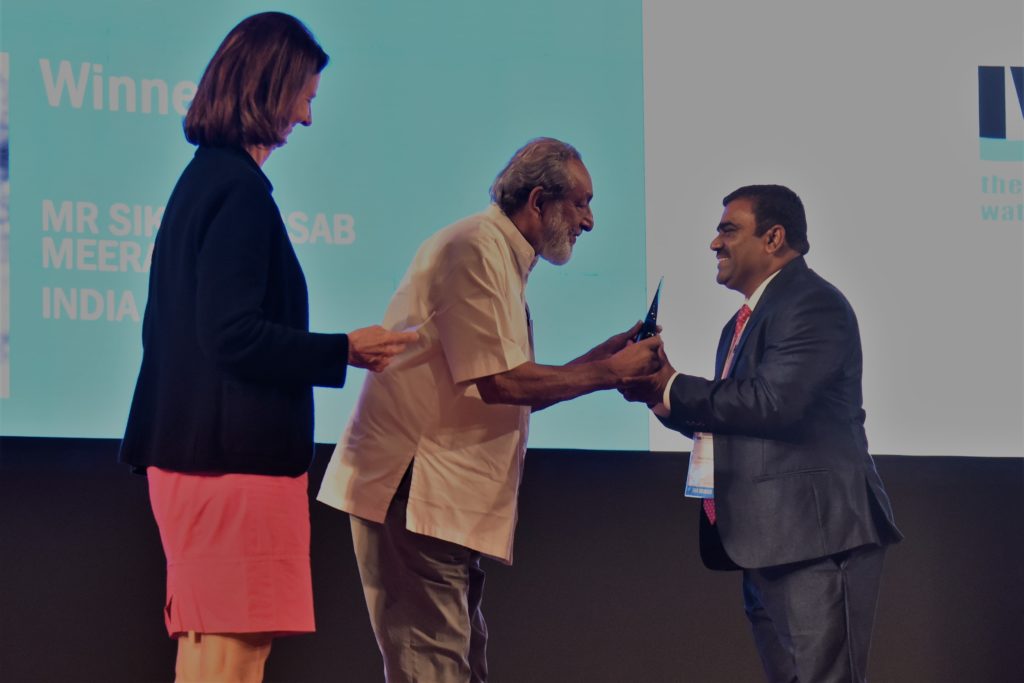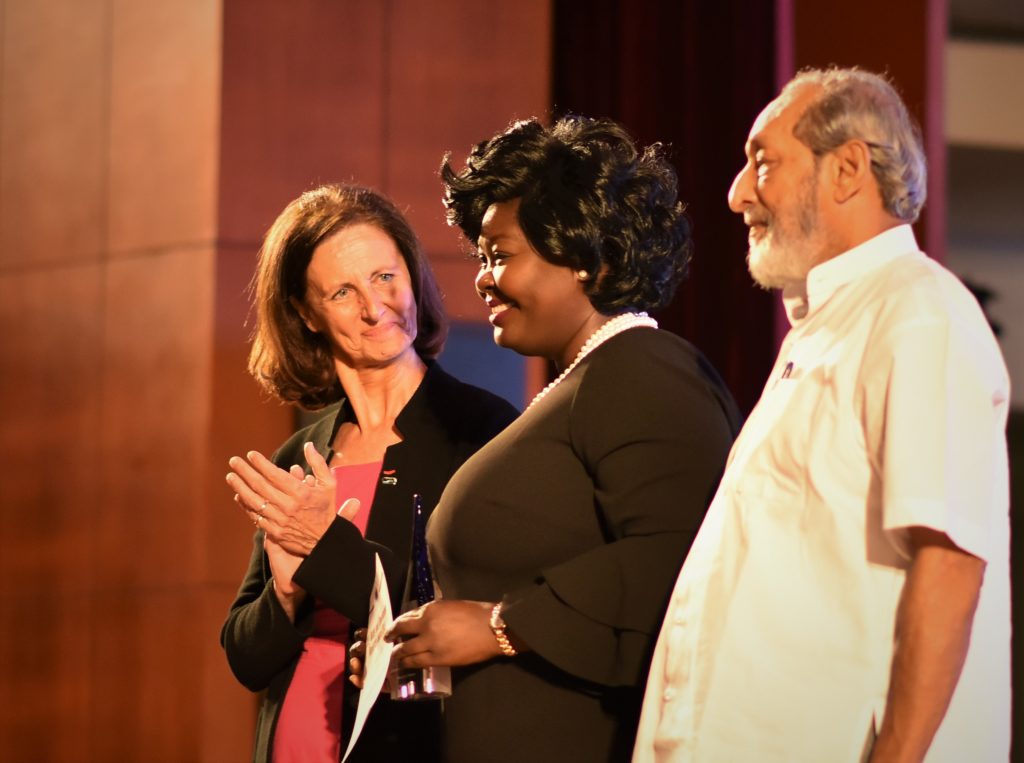Two IWA Development Awards Celebrate Excellency in Research and Practice in Water and Sanitation
- Dr Miriam Otoo – research on resource recovery business models for lower and middle income countries
- Mr Sikandarsab Meeranaik – development and implementation of rainwater harvesting systems in vulnerable dry regions
Colombo, Sri Lanka, 1st December 2019. The International Water Association today announced the winners of its 2019 Development Awards, honouring Dr Miriam Otoo and Mr Sikandarsab Meeranaik for their contributions to progress on water needs in low- and middle-income countries.
The winners received the awards and cetificates by the honourable Vasudeva Nanayakkara, State Minister Urban Development, Housing & Water Supply of Sri Lanka, and Diane D’Arras, IWA President at the opening session of the IWA Water and Development Congress & Exhibition, in Colombo, Sri Lanka, in front of 1000 international water professionals, high level politicians and representatives from civil society.
Dr Miriam Otoo received the 2019 IWA Development Award – Research.
Dr Otoo is formerly the Research Group Leader – Resource Recovery and Reuse at the International Water Management Institute in Sri Lanka.
Her research work in the area of resource recovery and reuse (RRR), with a focus on business models that work for low- and middle-income countries (LMIC), was considered by the Award jury as being crucial to the progress of the sector.
Dr Otoo’s work goes beyond addressing the technical challenges of RRR and has influenced policy and adoption in international guidelines in LMIC.
The scientific rigour, the real case studies that demonstrate the application of RRR business models, and the innovative approach to RRR in LMIC, together with the policy influence of the work developed, were the main supporting reasons for the jury’s unanimous decision.
Mr Sikandarsab Meeranaik received the 2019 IWA Development Award – Practice.
Mr Meeranaik, CEO of the Sankalpa Rural Development Society, started a non-governmental organisation (NGO) that installs rainwater harvesting recharge systems in bore wells in rural India.
The low cost technology implemented in extremely vulnerable dry regions was considered to epitomize the spirit of the IWA Development Award – Practice. The business model incentivizes the transfer of funds from companies to farmers, having a strong direct impact in the communities served, as well as contributing to maintenance of food production in times of drought.
To date, Mr Meeranaik has implemented the system across India, in over 1,500 bore wells.
Photo from left to right: Diane D’Arras and Vasudeva Nanayakkara hand-over Award sculpture and certificate to Mr Sikandarsap Meeranaik
On receiving the award, Mr Meeranaik commented “I am so honoured to have been chosen for this Award. All my working life has been focused on how to save rainwater for a better tomorrow. This award will help me and my team to spread our technology of rain water harvesting throughout India and to scale up to reach those who are also in need in the wider world.”
In continuation he said, “it will give me a stronger voice to speak up for water. The seeds I have planted over the past 11 years are growing and the work is spreading – thank you helping me to realise our vision of ‘enough water for all’.”
Photo from left to right: Diane D’Arras, Miriam Otoo, and Vasudeva Nanayakkara
“I am extremely honoured to be receiving this award from IWA, which I share with all of my colleagues. I am earnestly grateful for the recognition given to the importance of business innovation in resource recovery and reuse (RRR) for sustainable sanitation and water management” said Dr Otoo.
“Whilst many technical options are available, particularly in developing countries”, she continued, “workable business models that incentivize private sector participation, leverage private capital and form functional public-private partnerships, which help realize commercial or social value, shifting the focus from treatment for waste(water) disposal to treatment of waste as a valuable resource for safe reuse, are critical in achieving sustainable sanitation and water management.”
Unprecedented interest
This year’s awards attracted and unprecedented level of interest, with 74 valid award peer nominations from 29 countries.
Nominated candidates were invited to make submissions on the direct and indirect impact and the innovative nature of their work, emphasising contributions to poor communities in low and middle income countries.
A total of 41 completed applications were received from 19 countries, with 25 candidates in the Research category and 16 candidates in the Practice category.
The IWA secretariat then invited an expert jury of members involved in water development in LMIC to score each proposal. Given the high number of candidates, the evaluation process ensured at least 2-3 jury members considered each submission.
Each category jury then held a teleconference to discuss the merits of the four top-scoring candidates in their respective category and to reach a consensus on the proposed winner. Final endorsement of the winners was by IWA’s Governance and Nominations Committee.
Ends
—
Media contacts
- Rui Veras, IWA Marketing & Communications Director (interim) rui.veras@iwahq.org
- Ulrike Kelm, IWA Communications Manager ulrike.kelm@iwahq.org
About the IWA
The International Water Association is the largest international network of water professionals working towards a water-wise world. With members in more than 140 countries and over 70 years heritage, the association focuses on developing solutions for water and wastewater management. As a knowledge hub for the latest science, technology and best practice in the water sector at large, the IWA works to place water on the global political agenda and to influence best practice in regulation and policymaking. The IWA is a global water association that brings together water professionals to close the gap between sciences and practice to provide solutions to the water challenges the world is facing. www.iwa-network.org
Background to the IWA Development Award
The IWA Development Award is in recognition of an outstanding innovation or contribution to science or practice which has led to demonstrable uptake/impact/influence at national, regional or international levels in low and middle income countries.There are two categories of award: one for practice and one for research.



